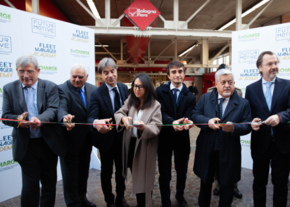
Aftermarket, this is how new technologies will transform car repair services
Stefano Belfiore
To retain competitiveness in the business new 4.0 mechanics must acquire new skills, managerial talent and cutting-edge equipment to attract clients and deal with “smart vehicles”.
Autonomous driving, electric vehicles and digitization are, quite evidently, rising the technological bar, with the whole aftermarket supply chain in the thick of things. No one excused. Not even mechanics (or mechatronics as they are often called nowadays) who need to acquire a wealth of new skills to cope with future auto-repair and maintenance procedures. For example, if spare parts dealers are called upon to reconsider investments in warehousing and logistics, in this new mobility scenario, car repairers, on the other hand, are faced with having to learn new skills, whether of a technical, managerial or communicative nature. However, one thing is certain: specialization can no longer be considered an option, but rather an obligation. Not to mention the importance of deciding which direction to take or future strategy to adopt so as to cope with the epoch-making changes currently taking place. In short, an opportunity not to be missed.
Times are changing, and so are skills
The car market has clearly evolved over the last ten years. Therefore, car repairers need a wide range of skills in order to be able to deal with any kind of vehicle entering the workshop. This was the outset of the assumption by the National president of Confartigianato Autoriparazione Alessandro Angelone, who says: "We must always be prepared, ready to study and understand the logic behind today's and tomorrow's vehicles. Automotive specialists must be aware (and fortunately this is already the case in a growing number of instances) that training should not be considered just a cost but as an investment needed to improve competitiveness".
Equipment matters
As important as it may be, the experience gained so far in the field can no longer be considered enough (though essential in carrying on the business). Modern tools and equipment are equally essential as competitive levers. Forget the traditional image of mechanics with greasy hands and spanners. Dealing with modern and complex vehicles and engines, or state-of-the-art Adas devices (such as automatic steering and braking) is anything but simple and requires, as already mentioned, new skills. Expertise on the one hand and specially calibrated equipment such as cutting-edge diagnostics and predictive maintenance tools on the other, able to reduce vehicle downtime due to mechanical failure.
Not just hardware
Timely replacement of components implies, now more than ever, the availability of an efficient database in the workshop (always up-to-date) able to provide specialists with all the technical information required and all the data for quick and precise identification of the parts to be replaced. "We’re talking of a wealth of information - continues Angelone – that, even before starting a job, will detect with pinpoint accuracy where and how to intervene". A great support tool for any car repairers (given the importance of these management software) in a scenario in which Figiefa (The European Federation of The Automotive Aftermarket Distributors) is currently engaged in an awareness campaign in favour of free access to vehicle data which must be available for after-sales operators as well.
Workshop 2.0: knowing how to communicate
Besides old and new skills and equipment, another key point deserves due consideration. The first axiom of communication reads: "Lack of communication must be avoided at all costs". An effective multi-channel platform represents a valuable asset for any workshop, which must be considered a full-fledged enterprise. Today, more than ever, a successful communication strategy cannot neglect a vital digital strategy. A workshop must be visible online, with a structured presence on the web, the perfect place to display ones skills and provide precious advice to the motorist in view of developing a consumer focused marketing model, or purchase funnel. A nicely laid out website site and/or blog, for example, where useful tips on how to preserve the efficiency of one’s vehicle can be dispensed, is the perfect starting point. Not to mention social networks, the perfect digital storytelling channel, where one can showcase his business on the right business platforms 2.0. Furthermore, and it goes without saying, one must not neglect offline communication. An example of this is the visual layout of the workshop, which must be able to welcome any potential client. Make no mistake, first impressions do counts!
Mechatronic specialist and manager
In addition to being a good repairer (one who regularly looks at the latest news and trends), and a positive communicator, today's mechanic must learn to become a more than capable manager. Yet another broken stereotype. No longer just a repairer, but someone able to run a business also from a financial point of view, dealing with fundamental aspects such as profitability.
The key word: multiservice
A further element to consider. "Creating the right synergies within the sector will prove to be a winning factor", points out Angelone. "The workshop - he continues - must become increasingly multi-service since not everyone can do everything. It is essential to focus on individual specializations, integrating them wisely". Motorists will thus find a single place capable of supplying and providing everything they need.
Desperately seeking mechanics
In such a rapidly evolving scenario - where cars, with EVs looming on the horizon and in need of specific maintenance and repair jobs – traditional mechanics seem to be losing their appeal. And we are not talking of generational transitions here, but rather of a job that is no longer able to attract young post-school-age employees. The latest screening of the Excelsior information system, carried out by Unioncamere in collaboration with Anpal (based on the revenues expected by the sector between August and October 2018), shows that mechanics (along with blacksmiths, welders, assemblers and metalworking machine operators) were among the most difficult specialized figures to be found on the job market during the month of August. A lack of interest by our young ones? Maybe. However, this trend seems to clash with a market (whether authorized or independent networks) that keeps looking for skilled and specialized labour.
Times are changing, and so are skills
The car market has clearly evolved over the last ten years. Therefore, car repairers need a wide range of skills in order to be able to deal with any kind of vehicle entering the workshop. This was the outset of the assumption by the National president of Confartigianato Autoriparazione Alessandro Angelone, who says: "We must always be prepared, ready to study and understand the logic behind today's and tomorrow's vehicles. Automotive specialists must be aware (and fortunately this is already the case in a growing number of instances) that training should not be considered just a cost but as an investment needed to improve competitiveness".
Equipment matters
As important as it may be, the experience gained so far in the field can no longer be considered enough (though essential in carrying on the business). Modern tools and equipment are equally essential as competitive levers. Forget the traditional image of mechanics with greasy hands and spanners. Dealing with modern and complex vehicles and engines, or state-of-the-art Adas devices (such as automatic steering and braking) is anything but simple and requires, as already mentioned, new skills. Expertise on the one hand and specially calibrated equipment such as cutting-edge diagnostics and predictive maintenance tools on the other, able to reduce vehicle downtime due to mechanical failure.
Not just hardware
Timely replacement of components implies, now more than ever, the availability of an efficient database in the workshop (always up-to-date) able to provide specialists with all the technical information required and all the data for quick and precise identification of the parts to be replaced. "We’re talking of a wealth of information - continues Angelone – that, even before starting a job, will detect with pinpoint accuracy where and how to intervene". A great support tool for any car repairers (given the importance of these management software) in a scenario in which Figiefa (The European Federation of The Automotive Aftermarket Distributors) is currently engaged in an awareness campaign in favour of free access to vehicle data which must be available for after-sales operators as well.
Workshop 2.0: knowing how to communicate
Besides old and new skills and equipment, another key point deserves due consideration. The first axiom of communication reads: "Lack of communication must be avoided at all costs". An effective multi-channel platform represents a valuable asset for any workshop, which must be considered a full-fledged enterprise. Today, more than ever, a successful communication strategy cannot neglect a vital digital strategy. A workshop must be visible online, with a structured presence on the web, the perfect place to display ones skills and provide precious advice to the motorist in view of developing a consumer focused marketing model, or purchase funnel. A nicely laid out website site and/or blog, for example, where useful tips on how to preserve the efficiency of one’s vehicle can be dispensed, is the perfect starting point. Not to mention social networks, the perfect digital storytelling channel, where one can showcase his business on the right business platforms 2.0. Furthermore, and it goes without saying, one must not neglect offline communication. An example of this is the visual layout of the workshop, which must be able to welcome any potential client. Make no mistake, first impressions do counts!
Mechatronic specialist and manager
In addition to being a good repairer (one who regularly looks at the latest news and trends), and a positive communicator, today's mechanic must learn to become a more than capable manager. Yet another broken stereotype. No longer just a repairer, but someone able to run a business also from a financial point of view, dealing with fundamental aspects such as profitability.
The key word: multiservice
A further element to consider. "Creating the right synergies within the sector will prove to be a winning factor", points out Angelone. "The workshop - he continues - must become increasingly multi-service since not everyone can do everything. It is essential to focus on individual specializations, integrating them wisely". Motorists will thus find a single place capable of supplying and providing everything they need.
Desperately seeking mechanics
In such a rapidly evolving scenario - where cars, with EVs looming on the horizon and in need of specific maintenance and repair jobs – traditional mechanics seem to be losing their appeal. And we are not talking of generational transitions here, but rather of a job that is no longer able to attract young post-school-age employees. The latest screening of the Excelsior information system, carried out by Unioncamere in collaboration with Anpal (based on the revenues expected by the sector between August and October 2018), shows that mechanics (along with blacksmiths, welders, assemblers and metalworking machine operators) were among the most difficult specialized figures to be found on the job market during the month of August. A lack of interest by our young ones? Maybe. However, this trend seems to clash with a market (whether authorized or independent networks) that keeps looking for skilled and specialized labour.
On the same topic
#“OFFICINA 4.0: Digitalization and new mobility trends, the future of car repair”#Workshop 4.0: Robots and digital assistants


























